|
|
Effects of Pendular Waist on Gecko’s Climbing: Dynamic Gait, Analytical Model and Bio-inspired Robot
Wei Wang, Xuepeng Li, Shilin Wu, Peihua Zhu, Fei Zhao
Journal of Bionic Engineering. 2017, 14 (2):
191-201.
DOI: 10.1016/S1672-6529(16)60390-6
Most quadruped reptiles, such as lizards, salamanders and crocodiles, swing their waists while climbing on horizontal or vertical surfaces. Accompanied by body movement, the centroid trajectory also becomes more of a zigzag path rather than a straight line. Inspired by gecko’s gait and posture on a vertical surface, a gecko inspired model with one pendular waist and four active axil legs, which is called GPL model, is proposed. Relationship between the waist position, dynamic gait, and driving forces on supporting feet is analyzed. As for waist trajectory planning, a singular line between the supporting feet is found and its effects on driving forces are discussed. Based on the GPL model, it is found that a sinusoidal waist trajectory, rather than a straight line, makes the driving forces on the supporting legs smaller. Also, a waist close to the pygal can reduce the driving forces compared to the one near middle vertebration, which is in accord with gecko’s body bending in the process of climbing. The principles of con?guration design and gait planning are proposed based on theoretical analyses. Finally, a bio-inspired robot DracoBot is developed and both of the driving force measurements and climbing experiments reinforce theoretical analysis and the rationality of gecko’s dynamic gait.
Related Articles |
Metrics
|

 Table of Content
Table of Content
 Table of Content
Table of Content